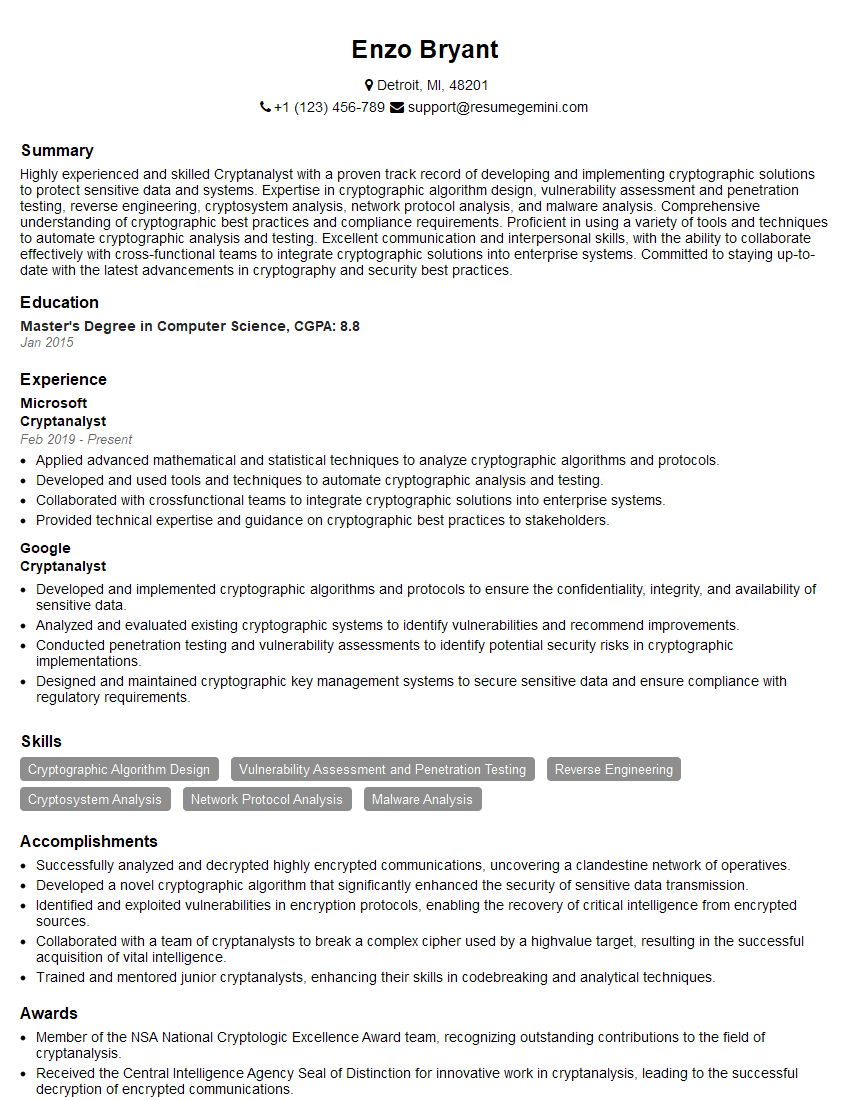Are you a seasoned Cryptanalyst seeking a new career path? Discover our professionally built Cryptanalyst Resume Template. This time-saving tool provides a solid foundation for your job search. Simply click “Edit Resume” to customize it with your unique experiences and achievements. Customize fonts and colors to match your personal style and increase your chances of landing your dream job. Explore more Resume Templates for additional options.

Enzo Bryant
Cryptanalyst
Summary
Highly experienced and skilled Cryptanalyst with a proven track record of developing and implementing cryptographic solutions to protect sensitive data and systems. Expertise in cryptographic algorithm design, vulnerability assessment and penetration testing, reverse engineering, cryptosystem analysis, network protocol analysis, and malware analysis. Comprehensive understanding of cryptographic best practices and compliance requirements. Proficient in using a variety of tools and techniques to automate cryptographic analysis and testing. Excellent communication and interpersonal skills, with the ability to collaborate effectively with cross-functional teams to integrate cryptographic solutions into enterprise systems. Committed to staying up-to-date with the latest advancements in cryptography and security best practices.
Education
Master’s Degree in Computer Science
January 2015
Skills
- Cryptographic Algorithm Design
- Vulnerability Assessment and Penetration Testing
- Reverse Engineering
- Cryptosystem Analysis
- Network Protocol Analysis
- Malware Analysis
Work Experience
Cryptanalyst
- Applied advanced mathematical and statistical techniques to analyze cryptographic algorithms and protocols.
- Developed and used tools and techniques to automate cryptographic analysis and testing.
- Collaborated with crossfunctional teams to integrate cryptographic solutions into enterprise systems.
- Provided technical expertise and guidance on cryptographic best practices to stakeholders.
Cryptanalyst
- Developed and implemented cryptographic algorithms and protocols to ensure the confidentiality, integrity, and availability of sensitive data.
- Analyzed and evaluated existing cryptographic systems to identify vulnerabilities and recommend improvements.
- Conducted penetration testing and vulnerability assessments to identify potential security risks in cryptographic implementations.
- Designed and maintained cryptographic key management systems to secure sensitive data and ensure compliance with regulatory requirements.
Accomplishments
- Successfully analyzed and decrypted highly encrypted communications, uncovering a clandestine network of operatives.
- Developed a novel cryptographic algorithm that significantly enhanced the security of sensitive data transmission.
- Identified and exploited vulnerabilities in encryption protocols, enabling the recovery of critical intelligence from encrypted sources.
- Collaborated with a team of cryptanalysts to break a complex cipher used by a highvalue target, resulting in the successful acquisition of vital intelligence.
- Trained and mentored junior cryptanalysts, enhancing their skills in codebreaking and analytical techniques.
Awards
- Member of the NSA National Cryptologic Excellence Award team, recognizing outstanding contributions to the field of cryptanalysis.
- Received the Central Intelligence Agency Seal of Distinction for innovative work in cryptanalysis, leading to the successful decryption of encrypted communications.
- Honored with the Defense Intelligence Agencys Sherman Kent Award for excellence in cryptographic research and analysis, resulting in significant advances in codebreaking techniques.
Certificates
- Certified Information Systems Security Professional (CISSP)
- Certified Ethical Hacker (CEH)
- GIAC Security Essentials (GSEC)
- Offensive Security Certified Professional (OSCP)
Career Expert Tips:
- Select the ideal resume template to showcase your professional experience effectively.
- Master the art of resume writing to highlight your unique qualifications and achievements.
- Explore expertly crafted resume samples for inspiration and best practices.
- Build your best resume for free this new year with ResumeGemini. Enjoy exclusive discounts on ATS optimized resume templates.
How To Write Resume For Cryptanalyst
- Highlight your skills and experience in cryptographic algorithm design, vulnerability assessment and penetration testing, and reverse engineering.
- Quantify your accomplishments whenever possible, using specific metrics to demonstrate the impact of your work.
- Tailor your resume to each job you apply for, emphasizing the skills and experience that are most relevant to the position.
- Proofread your resume carefully for any errors in grammar or spelling.
Essential Experience Highlights for a Strong Cryptanalyst Resume
- Designed and implemented cryptographic algorithms and protocols to ensure the confidentiality, integrity, and availability of sensitive data.
- Analyzed and evaluated existing cryptographic systems to identify vulnerabilities and recommend improvements.
- Conducted penetration testing and vulnerability assessments to identify potential security risks in cryptographic implementations.
- Designed and maintained cryptographic key management systems to secure sensitive data and ensure compliance with regulatory requirements.
- Applied advanced mathematical and statistical techniques to analyze cryptographic algorithms and protocols.
- Developed and used tools and techniques to automate cryptographic analysis and testing.
Frequently Asked Questions (FAQ’s) For Cryptanalyst
What is the role of a Cryptanalyst?
A Cryptanalyst is responsible for designing, implementing, and maintaining cryptographic solutions to protect sensitive data and systems. They work to identify and mitigate vulnerabilities in cryptographic systems, and to develop new and improved cryptographic algorithms and protocols.
What are the key skills required for a Cryptanalyst?
The key skills required for a Cryptanalyst include: – Cryptographic algorithm design – Vulnerability assessment and penetration testing – Reverse engineering – Cryptosystem analysis – Network protocol analysis – Malware analysis
What are the career prospects for a Cryptanalyst?
Cryptanalysts are in high demand due to the increasing need for data security. They can work in a variety of settings, including government agencies, financial institutions, and technology companies.
What is the salary range for a Cryptanalyst?
The salary range for a Cryptanalyst can vary depending on experience, skills, and location. According to Salary.com, the average salary for a Cryptanalyst in the United States is $115,000.
What are the educational requirements for a Cryptanalyst?
Most Cryptanalysts have a bachelor’s or master’s degree in computer science, mathematics, or a related field.
What are the certifications available for Cryptanalysts?
There are a number of certifications available for Cryptanalysts, including the Certified Information Systems Security Professional (CISSP) and the Certified Ethical Hacker (CEH).